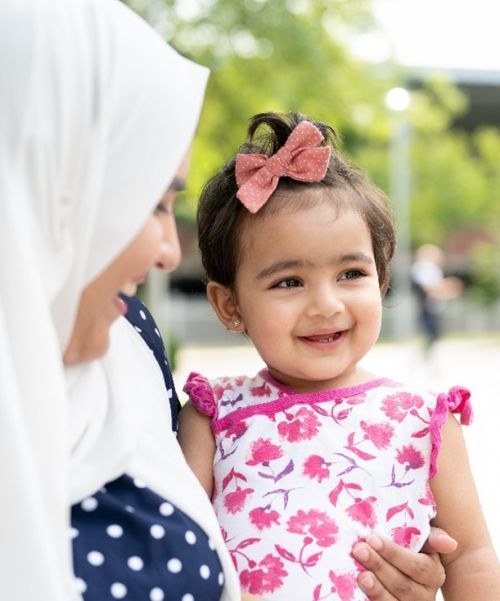Escaping Domestic Violence
Arshiya came to the US in 2022, newly married and full of hope for her life ahead. Instead of the life she envisioned, she found herself isolated, alone, and pregnant. Her husband, she shares, was emotionally abusive, financially controlling, and often intimidating.

Arshiya, and her daughter, Rehana
She knew no one. “He never allowed me to go outside,” she recounts. “I was afraid to ask anything.” He would argue with her about spending even a few dollars.
After the birth of her daughter, the abuse only escalated. When he grew angry, he would punch walls. One Saturday, as she held the baby in her arms, he violently pushed her into a wall. He stormed off, leaving her frightened and unsure where to turn.
Arshiya reached out to Buffy Sheff Ross, MSW, LICSW, at Newton-Wellesley Hospital, whom she’d spoken with late in her pregnancy. Buffy immediately connected her with Rehana Rahman Kiani, MSW, LICSW, program manager of the hospital’s Domestic Violence/Sexual Assault Program.
Ever since, “Rehana’s been a godsend,” says Arshiya.
Easing her heart
In spite of all the unknowns, “my heart always felt at ease with Rehana,” Arshiya remembers. “She gave me support and validation that this was abuse.”
Over the course of a year and a half, Rehana and the DV/SA program provided Arshiya with unwavering support. Rehana spoke with her regularly. She advocated for Arshiya with the state, connecting her with advocacy, immigration, and legal resources through local nonprofits including Saheli, De Novo, and Greater Boston Legal Services.
A strong advocate for herself and her daughter, Arshiya retained an attorney to help her get a restraining order. Before and after the court hearing, Rehana provided emotional support, walking with her every step of the way.
It’s been a long road with years of abuse. “Now, it’s come full circle,” Arshiya says. “My judgment has come through: full custody of the baby and permission to go back home.”
“If it wasn’t for Rehana, I don’t know what I would have done,” she adds. “She’s been everything to me.”
Never hesitate to ask for help
What would Arshiya want others in similar situations to know? “Never hesitate to ask for help. Never.”
Even when people want to get out of a violent relationship, they often don’t know where to turn. “It’s not easy to get out of the clutches,” she knows. “It’s a vicious cycle.”
Rehana underscores that “partner violence is unfortunately common, and survivors often face immense barriers when seeking support—social stigma, significant safety concerns, and a lack of available resources. Shelters are often overwhelmed, and supportive services do not have adequate funding, making it difficult for survivors to access help when they need it most.”
She feels fortunate that Arshiya entrusted her to support her. “She did all the hard work; I was here to cheer her on.”
As Rehana notes, “information is power.” Too often, “people think it doesn’t happen in this community,” she says. “It does.” Besides her role as DV/SA program manager, she strives to enhance public awareness and support as hospital champion of NWH’s Domestic and Sexual Abuse Council.
A better life for her daughter
“I was weak, broken, and lost,” Arshiya reflects. “I’m not afraid anymore.”
“Rehana gave me the confidence that I can be a good mother,” she says. “I am confident that I can give my daughter a better life. She is safe.” With gratitude for Rehana and the NWH program, Arshiya adds, “the least I can do is to tell my story.”